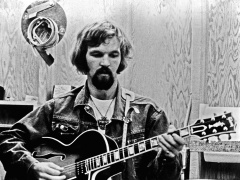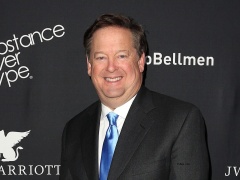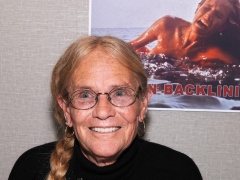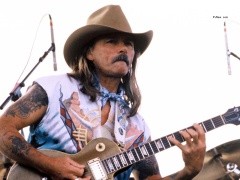
Oscar-nominated actor Ryan O’Neal, who came to prominence on TV’s “Peyton Place” and became a top star of the 1970s in films including “Love Story,” “What’s Up, Doc?,” “Paper Moon” and “Barry Lyndon,” died Friday, his son Patrick said on Instagram. He was 82.
O’Neal was diagnosed with chronic leukemia in 2001 and with prostate cancer in 2012.
“Ryan was a very generous man who has always been there to help his loved ones for decade upon decade,” his son wrote. “My dad was 82, and lived a kick ass life. I hope the first thing he brags about in Heaven is how he sparred 2 rounds with Joe Frazier in 1966, on national TV, with Muhammad Ali doing the commentary, and went toe to toe with Smokin’ Joe.”
In later years, O’Neal’s acting work often took a backseat to media coverage on his personal travails, involving his combative relationship with longtime companion Farrah Fawcett, who died of cancer in 2009, and with his children, including Redmond O’Neal and actress Tatum O’Neal.
But in the 1970s, he was a marquee draw. In 1973, he ranked behind only Clint Eastwood in terms of box office draw — and ahead of stars like Steve McQueen, Burt Reynolds and Robert Redford.
“Love Story” was the No. 1 film of 1970, grossing $106 million in the U.S. and Canada, and the sixth highest grossing film of all time at that point. The melodramatic romance, based on Erich Segal’s bestselling novel, was also a cultural phenomenon, with its signature line of dialogue, “Love means never having to say you’re sorry,” spoken both by Ali MacGraw and O’Neal at different times, inspiring parody for decades.
“Love Story” was nominated for seven Academy Awards, with O’Neal picking up a nomination for lead actor. O’Neal returned for the adaptation of Segal’s sequel “Oliver’s Story” in 1978, co-starring with Candice Bergen.
In his first film after “Love Story,” Blake Edwards’ 1971 Western “The Wild Rovers,” he was paired with William Holden, then appeared in 1973’s “The Thief Who Came to Dinner,” with Jacqueline Bisset. He starred with Barbra Streisand to enormous comic effect in Peter Bogdanovich’s screwball comedy “What’s Up, Doc?” (Streisand and O’Neal were less successful together in the 1979 boxing comedy “The Main Event,” which was nevertheless a hit).
The actor reteamed with director Bogdanovich on 1973’s charming yet unsentimental Depression-era comedy “Paper Moon,” which paired O’Neal winningly with his daughter Tatum — who went on to win the best supporting actress Oscar, becoming the youngest winner ever in a competitive category.
Ryan and Tatum O’Neal also appeared in Bogdanovich’s 1976 paean to early filmmaking, “Nickelodeon,” but that film, which also starred Burt Reynolds, drew mixed reviews.
O’Neal starred with Marisa Berenson in Stanley Kubrick’s highly praised 1975 period piece “Barry Lyndon.” The historical epic is now considered one of the greatest films ever made, ranking 47th on the British Film Institute’s 2022 Sight and Sound poll.(A decade later, O’Neal and Fawcett would name their son, Redmond, after his character’s true name in the film.)
The youthful actor’s casting as a senior military officer in the star-studded 1977 WWII epic “A Bridge Too Far” proved unfortunate. Roger Ebert was unforgiving: “He lacks age, authority, wisdom and what’s worse, his voice sounds as if he’s about to cry.” O’Nealwas far more authoritative as the laconic title character in Walter Hill’s excellent 1978 neo-noir actioner “The Driver.”
The 1980s found the star in a series of underwhelming comedies including “So Fine,” “Irreconcilable Differences” and “Partners”; he did more interesting work as an alcoholic ex-con in Norman Mailer’s directorial effort “Tough Guys Don’t Dance.”
The actor starred opposite Fawcett in the 1989 ABC telepic “Small Sacrifices,” and the couple toplined the brief CBS sitcom “Good Sports,” playing anchors on a sports network, in 1991.
O’Neal’s sporadic efforts during the ’90s also included the charming 1992 telepic “The Man Upstairs,” in which he starred opposite a feisty Katherine Hepburn; Paul Mazursky’s critically reviled 1996 feature “Faithful,” in which O’Neal starred as Cher’s cheating husband; and Jake Kasdan’s comedic thriller “Zero Effect.”
In the 2002 Al Pacino vehicle “People I Know,” O’Neal played effectively the kind of role to which he became increasingly accustomed: a womanizing movie star, seemingly modeled on Warren Beatty. PvNew’s review said, “O’Neal combines professional public-profile charm with self-centered focus.”
On the small screen he was a regular on the brief 2003 Alicia Silverstone series “Miss Match” and had recurring roles on a number of TV series, including “Bull”; “90210”; and “Bones,” as Max Keenan, the father of Emily Deschanel’s Dr. Temperance “Bones” Brennan. He also guested on “Desperate Housewives.” In 2015, he had a small role in Terrence Malick’s feature “Knight of Cups.”
O’Neal reunited with his “Love Story” co-star Ali MacGraw to appear in A.R. Gurney’s “Love Letters.” PvNew said: “The play seems tailor-made for the pair, who imbue their performances not only with palpable spark and gripping emotional depth but also with an aura of winsome nostalgia for a time when they were the industry’s most romantically tragic — and, therefore, most perfect — onscreen couple.”
Charles Patrick Ryan O’Neal was born in Los Angeles on April 20, 1941, the son of actress Patricia O’Callaghan and novelist-screenwriter Charles “Blackie” O’Neal. (Ryan’s mother would later appear in small roles in a couple of his films.) Ryan O’Neal trained as a boxer before the family moved for a time to Munich, Germany.
O’Neal began his acting career in television, guesting on shows including “The Many Loves of Dobie Gillis,” “The Untouchables,” “Leave It to Beaver” and “My Three Sons” before being cast, at age 22, as the second male lead in the contemporary Western series “Empire,” starring Richard Egan.
Two years later, O’Neal started a five-year run as Rodney Harrington in the ABC primetime soap “Peyton Place,” adapted from the earlier bestselling novel and hit film. The series, in which O’Neal starred opposite Mia Farrow, was a top-20 hit until Farrow left in 1966.
The actor made his feature-film debut in 1969’s “The Big Bounce,” an adaptation of the Elmore Leonard novel in which he starred with Leigh-Taylor Young, who had been cast as Farrow replacement’s on “Peyton Place” and became O’Neal’s second wife in 1967.
He next played a marathoner in the Olympics-themed film “The Games.” Far more significant for him in 1970, however, was the phenomenon that was “Love Story.”
O’Neal met Fawcett through his friend and her husband, Lee Majors, in 1981. O’Neal and Fawcett became a couple soon after she divorced Majors the next year, but they broke up and got back together repeatedly over the years.
O’Neal’s memoir “Both of Us: My Life With Farrah” was published in May 2012.
O’Neal was married twice, both time to actresses: Joanna Moore, who died in 1997, and Leigh Taylor-Young. He is survived by daughter Tatum and son Griffin, by Moore; son Patrick, an actor and sportscaster, by Taylor-Young; and son Redmond, from his relationship with Fawcett.






